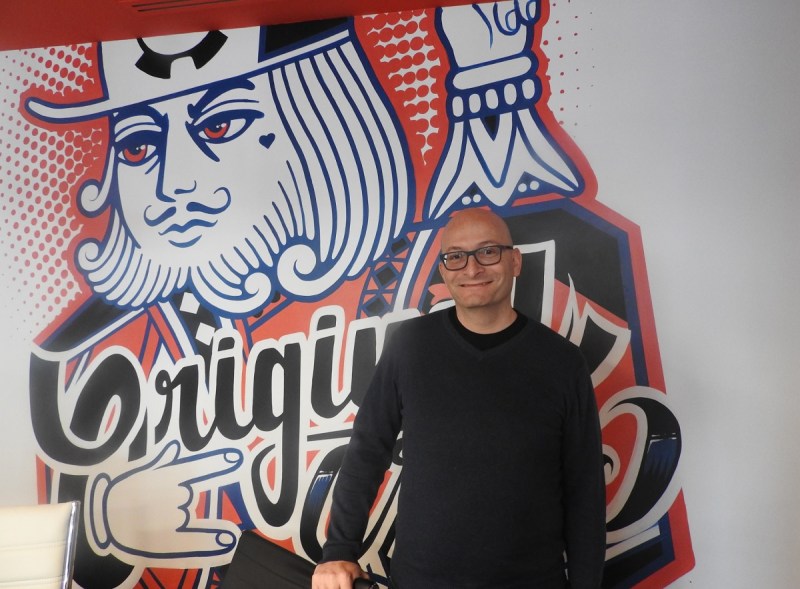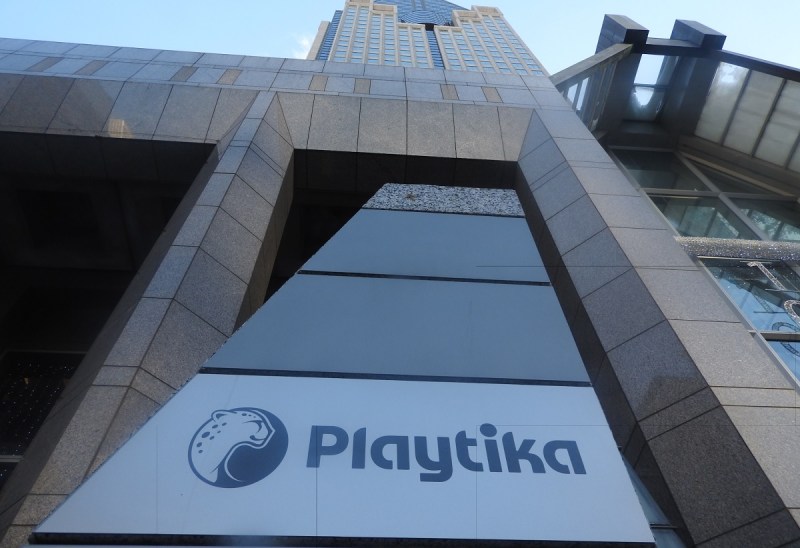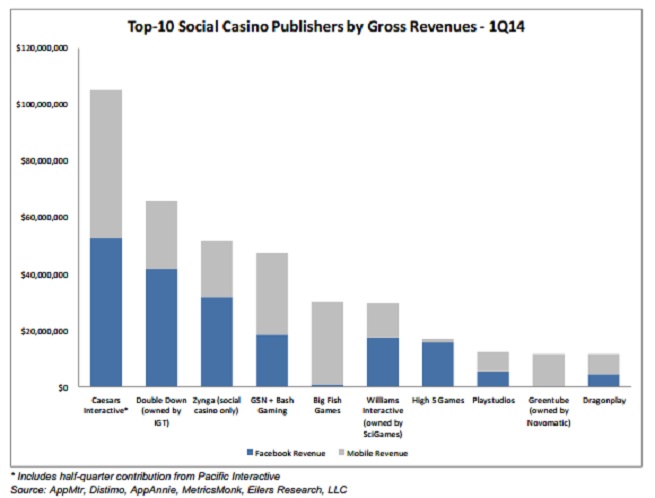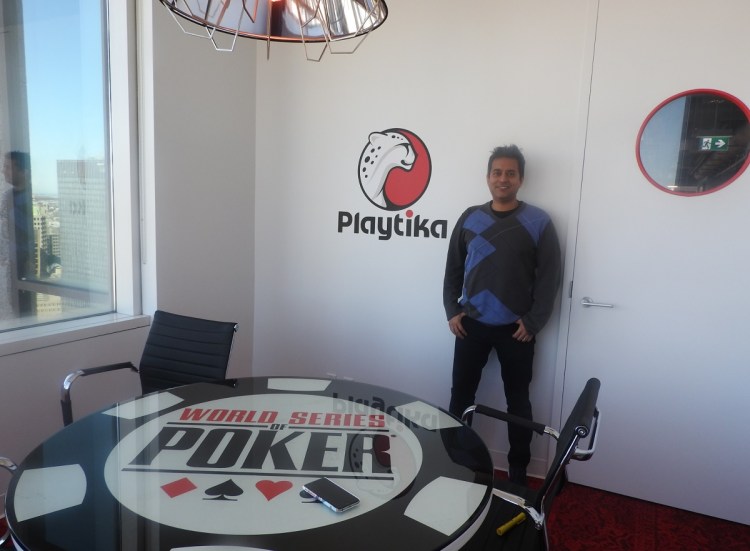Social casino games have become a $4.2 billion business, and Israel-based Playtika has about a quarter of the market. The company, which was acquired last year by a Chinese consortium for $4.4 billion, generated an estimated $306 million in the most recent quarter, up 26 percent from a year ago, according to market researcher Eilers & Krejcik.
And a big part of that revenue comes from the World Series of Poker, a web and mobile game that is based on the popular TV show series. The game has a big brand name, but Playtika has been growing the property on an annual basis, thanks to a combination of aggressive user acquisition, live operations such as new kinds of tournaments, and big efforts to retain players. Those tactics have made the game into the “Candy Crush Saga of poker.”
I visited Playtika’s World Series of Poker office in Montreal last week during the MIGS 2017 game conference. The office, which is home to more than 100 employees, was on the top floor of a skyscraper with a view of all of the snow-covered buildings and streets in downtown. I interviewed Jeet Niyogi, marketing director for the World Series of Poker at Playtika, and Yoav Ecker, general manager of World Series of Poker and Playtika Canada in Montreal.
Here’s an edited transcript of our talks.

Above: Yoav Ecker is general manager of World Series of Poker and Playtika Canada in Montreal.
GamesBeat: Do you remember when World Series of Poker started?
Jeet Niyogi: We were about 40 to 45 people at Electronic Arts, EA Mobile. Frank Gibeau was in charge. It was established over a few years. We launched in 2013. We were acquired by Caesar’s Interactive.
GamesBeat: Was it always only a mobile franchise?
Niyogi: Yes. The mobile product was launched first, and that’s where the emphasis was. Then we launched the Facebook game a couple of months later, but the mobile launch was the first launch.
In mid-2013 the sale happened, of the EA group, 19 people. The initial first few months was around building and stabilizing the product. The new product was launched at the end of 2013, the completely new World Series of Poker as we know it today.
GamesBeat: Was Playtika already big in social casino at the time?
Niyogi: Yes, Playtika had Slotomania and Caesar’s Slots around the same time. Bingo Blitz was an acquisition that happened in 2011 or 2012. They had a few big games. This was the third or fourth big acquisition. House of Fun came later, after us. Those were the big five in the top 100 grossing overall — not just games, but overall: Slotomania, World Series of Poker, House of Fun, Caesar’s Slots, and Bingo Blitz.
GamesBeat: And it stayed in the rankings all that time. What do you think explains why it stood out, among all the casino games and all the poker games?
Niyogi: Slotomania launched in 2010-2011. The famous story goes that everyone in Israel laughed, because who would play slots just for fun? But the mechanics and the content were key differentiators. The nimbleness of the team, to provide a good content update every two or three weeks, was a great retention element, a great differentiator in the industry. That had never been done in slots. Zynga Poker had established itself in the poker industry. But the first mover advantage was there, plus the innovative content production. That’s what the audience came for, and then followed by good retention and monetization practices. That helped our business grow.
Moving on to World Series of Poker, that was a well-known brand in North America, but I’d say that now our mobile game is a bigger brand than the actual World Series of Poker tournament, globally and in North America. So it had the brand, but I think there are three or four things that made a huge difference. First of all, we innovated with the product from the start. A lot of focus went into the first launch, but that stayed subsequently. We stuck to giving a very good, authentic poker game, married with the brand equity we already had. But we also put in place a lot of innovative features over the years — things like the Texas Roulette event, where you can simply go all in or fold, without the intermediary steps any other poker game has. That worked really well.

Above: Playtika’s Montreal office is in a skyscraper.
Live operations is a key. But even before live operations becomes acquisition and marketing. We focused very much on relevance, not just throwing money out the door. Profitability was always, as in other Playtika games, a key measure. Coming in from EA, I was making heavy requests for investment, but we worked in a very sustainable fashion. Smart data-driven user acquisition. Live operations to bring people back.
We focus heavy on our D2 (day two retention of players), D7, D30, and even in some cases D360. We see what our annual retention is like for people we bring in. Playtika has obviously mastered monetization as well as retention. We benefited from those practices and learned a lot from the other guys, the Slotomania and Bingo Blitz teams. We reproduced those for the poker world.
The combination of all these facts—we’re still a small, nimble team. It’s not super large, only 119 people. Back then, everything was all in one studio – publishing, marketing, development. We were just the developers. I was the product marketing guy, and the UA team sat somewhere else. Having everyone under one roof and being able to work fast—we were making mistakes, still. Zynga Poker was our big competition, just to break even. When we started, we were in the 80s or 90s overall, or even lower. The few days we were ahead of Zynga Poker, we were very happy. But the product innovation worked, and making a very authentic poker product.
GamesBeat: Was Montreal an unusual place to do this? Or did it make sense in some way to keep the developers here?
Niyogi: We have good developers. Poker wasn’t something we innovated. [laughs] Everyone’s played poker. EA put the studio together because it already had a Montreal studio, and got some good breaks to set up here. There’s a very solid talent base. That helped. I think this is the fifth-largest gaming hub, something like that. Those things mattered. And then we grew. Some people have come from our HQ in Israel, of course. Those elements also help.
If I had to break it down to three points: smart decision-making, very data-driven decision-making, looking at profitability and marketing spend closely and bringing in relevant users. Product innovation. We launched bracelets, which was a huge success. The World Series of Poker awards bracelets, right? No one else can award real WSOP bracelets, so we did that and it was a big hit. And then innovations like Texas Roulette.
We did Poker Recall recently, which was very successful. It was a game where, every time you play a certain number of hands, everyone gets a pack with three cards. There’s a board of 20 cards you have to fill every time you get a card, and then you can make hands with those. It’s like a recall or memory game with poker skill. The higher the hand, the higher the payout. That was another innovation. So I’d put it down to active marketing and product innovation.
GamesBeat: But you guys came after Zynga Poker and started climbing the charts.
Niyogi: We grew at a very rapid pace. I believe by the end of 2014 or early 2015 we overtook them in the U.S., first on iOS and then on Google Play. In some countries they’re still stronger than us overall. I would say Germany, but they localized their game. Our game, we market it in a local way, but the game itself is not localized yet.
GamesBeat: As far as opportunities along the way, Zynga had a bad transition from the old poker to the new poker. They lost market share.
Niyogi: Yeah, that was 2014. It happened at a time when we were really scaling our operations up. We were on the rise. But regardless, we were focused on giving true poker players a very authentic experience. One more thing that comes to mind is app store optimization. When you searched for “poker” back in the day we would be eighth or ninth. In 2014 and 2015 we hit six or seven, and now we’re one or two most of the time. That makes a huge difference. 60-65 percent of people who are interested in poker just go into the app store search and type “poker.”
Obviously Apple is monetizing that. They’ve started Apple search ads. But organically, we are number one. Zynga Poker is number two. The algorithm is based on a lot of factors — download velocity, engagement, product reviews, ratings, conversion, keywords that you put in — and we worked on those things, I would say more than many in the industry. Our UA team and our SO team are quite well-known in the industry.

Above: A snowy view of downtown Montreal from Playtika’s office.
GamesBeat: Is that still a pretty big part of why Playtika is the biggest social casino company?
Niyogi: Yes. Similar maps can be drawn for each game, like Slotomania. The slots space is a lot more competitive than our space. It has many more players, as you know. But continuous innovation, understanding what players want – researching, analyzing – and producing that. To be nimble and produce a slot machine every two or three weeks is really something. We’ve been able to do that successfully, introduce meta-games like Slot Cards and Slot Quest — quests and collectibles along the way have helped retain and monetize in a game like ours.
Playtika’s mantra has also been acquisition, and then taking it to the next level. We had the recent acquisition of Jelly Button, with Pirate Kings and Board Kings, two very solid games. They’re already doing well and they’ll go hire.
GamesBeat: What else has helped World Series of Poker?
Ecker: That helps a lot. On top of that we’re also investing quite a lot in AI. We have strong team here to help us with that. It underlies the live operations part. That’s one thing that gives us a strong competitive advantage. Competitors can’t necessarily know what’s standing behind that. This is something I think only big companies can address and do properly. To do it properly the data needs to be very clean, very deep, very wide. We’ve invested very heavily and are still investing in that.
GamesBeat: Why does it take more than 100 people to run this game? Is that the scale of the live operations?
Niyogi: Everything is done here. The people here are doing marketing, user acquisition, and business intelligence. Live operations is a huge team. Every day you’re producing at least one event. Then you have sales and promotions on top. Innovative events to keep them engaged almost every day, and then some sales promotion on top of that. There’s a huge product team doing UI and UX. That’s all here. There’s a client dev team, a server dev team. And then there’s the management of all these different groups. Everything is controlled here. We’re top 50 overall. I think yesterday we were 44 or 45.
GamesBeat: You can justify a big team with that kind of result.
Niyogi: Yeah, absolutely. Some companies don’t focus as much on profitability, given their IP and their huge acquisition costs. But there’s always a smarter way of doing acquisition, bringing in only the relevant people and not paying for people who are going to leave. Our game is a multiplayer game, so we need people to be there. A poker player won’t wait. They’re not interested in playing against a machine. We need sticky players. Not all of them need to pay. There’s a focus on non-payers, building a game that will attract people in general.
GamesBeat: It’s amazing that one game can fuel such a large operation here.
Ecker: That’s the approach. We’re looking at it differently from other companies. At other companies, they call it a project. A project has a beginning, a middle, and an end. You ship it and forget about it. Because we’re doing all the live operations behind the game, we’re actually keeping the product alive all the time.
When I came here, the game designers were game designers. Now we call them product managers. It first it just feels like semantics — this is a journalist, this is a reporter, this is a blogger. But eventually it’s more philosophical than that. As a game designer you design a game and you ship it. As a product manager you have your own product and you have to constantly evolve it more and more.

Above: Top 10 social casino publishers in Q1 2014
GamesBeat: Poker seems like a mature market in some ways.
Ecker: The poker market, at least for us, is a growing market. We’ve managed to grow significantly over the years, especially last year. The competition is currently mainly with Zynga. They’ve done very good work this year. I think we’ve done better, but they’ve done very well. I’m looking forward to 2018. It’s a very optimistic year for me. We believe we’ll be able to grow quite substantially.
Players are getting more and more sophisticated. The way they’re playing is much smarter. They’re becoming more professional. We have some very interesting things in store for our players next year, things we’re developing and working on.
It is mature, but there’s a lot of innovation behind it. Looking at the road map here for the next three to five years, we have some very innovative things in store. Even simple things like what we’ve done in the last couple of years, like when we introduced Texas Roulette. It seems like a poker game, but we changed something in it, just took one step in the middle out, and you come up with a very popular game that our players love. We introduced Powerhand Jackpots. We introduced Poker Recall, which is a memory game combined on top of that, which has done very well for us. There are a lot of factors working in the background that are turning out very well.
GamesBeat: Did anything change when Playtika was acquired?
Niyogi: No, nothing surprising. That was the expectation, as well. The Chinese consortium bought it as an investment. Robert Antokol and the team here and all the other studios know how to make and grow a poker game or a slot game. Under Robert’s leadership — he’s as hungry as ever. He was here a few months ago to pep us up, when we were launching Poker Recall.
The involvement from the other guys is more from a books perspective, investment. We have to grow. We have a very defined growth strategy. It’s arduous, uphill, but we’ve been keeping that higher than usual growth. We’ll continue to do that. It gets harder and harder once you’re a bigger game.

